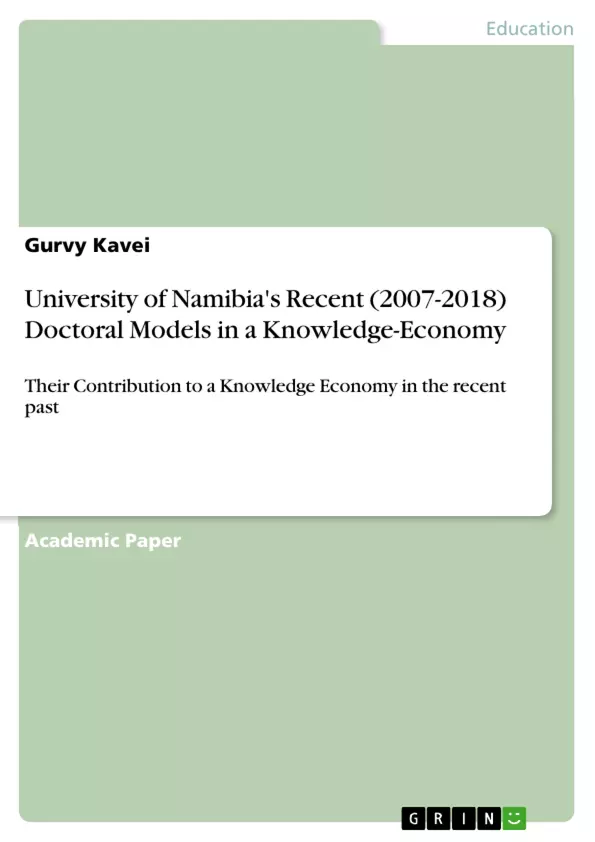This study had a purpose to understand the University of Namibia (UNAM)’s Doctoral Models and their performance in the recent past – 2012 to present. The method used was a simple desktop literature review on doctoral studies, the Namibian economy, state of higher education in the country, UNAM’s Policies and Practices on Doctoral studies, and performance of UNAM’s doctoral programs. It was found that the university is conformant to most international and national docterateness standards. As such there cannot be much doubt in terms of the quality of doctoral degrees that UNAM produces. However, limited doctoral supervisor’s capacity, over dependent on PhD by research mode – ignoring many other approaches, and the linkage of university financing formula to enrolment figures than to graduate figures – a disincentive to potential supervisors, are critically compromising the university performance with regard to numbers of PhD outputs. The effect is evident in poor fairing of the University on research, patents and industrial designs – a clear warning that the university fall far too shot of being a significant player in the aspiration of Namibian becoming a knowledge economy. Therefore, the study strongly recommends a change in the University financing formula by government (to take into account institutional outputs), investing more training and development for supervisory capacity, as well as more public investment into the production of intellectual property to enable the university to compete with its peers locally, regionally and internationally. Future empirical tracer study research need to narrow on the role PhD graduates play in a knowledge economy
Inhaltsverzeichnis (Table of Contents)
- Introduction and Background
- Conceptual Issues On Doctoral Studies
- Definition of a doctorate degree
- Types of Doctoral approaches
- Factors Affecting Timely Completion of a PhD
- The Namibian Economy
- UNAM Policies and Practices on Doctoral Studies
- Performance on Doctoral Delivery at UNAM
- Potential UNA's Contribution to a Knowledge Economy
- Conclusions and Recommendations
- References
- APPENDICES
Zielsetzung und Themenschwerpunkte (Objectives and Key Themes)
This study aims to examine the University of Namibia's (UNAM) doctoral models and their performance from 2012 to the present. It seeks to identify the doctoral models employed, determine the success rate of doctoral programs, and evaluate UNAM's potential contribution to Namibia's aspiration of becoming a knowledge-based economy.
- Doctoral models employed by UNAM
- Success rate of doctoral programs at UNAM
- UNAM's potential to contribute to a knowledge-based economy
- Factors influencing the timely completion of doctoral studies
- The role of doctoral graduates in a knowledge economy
Zusammenfassung der Kapitel (Chapter Summaries)
The first chapter introduces the study's objective and scope. It provides a background on UNAM's doctoral programs and the Namibian economy. Chapter two explores the conceptual issues surrounding doctoral studies, defining the doctorate degree, discussing types of doctoral approaches, and examining factors affecting timely completion of a PhD.
Schlüsselwörter (Keywords)
This study focuses on the University of Namibia, doctoral models, knowledge economy, doctorateness, research, and higher education in Namibia. It investigates the performance and effectiveness of UNAM's doctoral programs within the context of a knowledge-based economy. It also examines factors influencing the success of doctoral studies, such as supervisory capacity, research funding, and the impact of doctoral graduates on economic development.
Frequently Asked Questions
What are the main doctoral models used at the University of Namibia (UNAM)?
The university primarily relies on the "PhD by research" mode, though the study suggests that over-dependence on this single approach may limit overall output and that other international models should be considered.
What factors influence the timely completion of a PhD at UNAM?
Key factors include doctoral supervisor capacity, the availability of research funding, and the institutional support structures provided by the university's policies and practices.
How does UNAM contribute to Namibia's goal of a knowledge economy?
UNAM contributes by producing high-quality doctoral graduates, research, patents, and industrial designs. However, the study notes that current output levels need to increase for the university to be a significant player in the knowledge economy.
What are the quality standards for doctoral degrees at UNAM?
The study found that UNAM is conformant to most international and national "doctoreness" standards, ensuring that the quality of degrees produced is high and meets academic requirements.
What recommendations does the study make for university financing?
The study recommends that the government change the financing formula to take institutional outputs (graduation figures) into account rather than just enrollment figures, to incentivize supervisors.
Why is supervisor capacity a critical issue for UNAM?
Limited supervisory capacity compromises the university's performance in terms of PhD outputs. Investing in training and development for supervisors is essential to improve the number of graduates.
- Quote paper
- Gurvy Kavei (Author), 2022, University of Namibia's Recent (2007-2018) Doctoral Models in a Knowledge-Economy, Munich, GRIN Verlag, https://www.hausarbeiten.de/document/1284949


